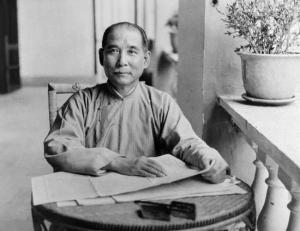 Today, October 10th marks the 100thanniversary of the start of China’s 1911 Xinhai Revolution, which ended 2,000 years of imperial rule. The start of the revolution marks the day Sun Yat Sen, known to the Chinese as the father of the nation launched his offensive against the Qing Dynasty (1644-1911) which eventually led to the formation of a Chinese republic under the leadership of Sun Yat-sen. On Jan 1, 1912, he became the president and formed the Kuomintang, and played a key role in uniting post-imperial China.
Today, October 10th marks the 100thanniversary of the start of China’s 1911 Xinhai Revolution, which ended 2,000 years of imperial rule. The start of the revolution marks the day Sun Yat Sen, known to the Chinese as the father of the nation launched his offensive against the Qing Dynasty (1644-1911) which eventually led to the formation of a Chinese republic under the leadership of Sun Yat-sen. On Jan 1, 1912, he became the president and formed the Kuomintang, and played a key role in uniting post-imperial China.
Revered by many Indian Chinese, just as they would Mahatma Gandhi, the father of India for his tenuous struggle against British imperialism in India, Sun Yat Sen is considered one of the greatest leaders of modern China. “I studied in a Chinese school in Kolkata that taught us about Sun Yat-sen’s contribution and his political philosophy which espoused nationalism, democracy, and people’s livelihood,” Paul Chung, a resident Chinese in Kolkata told the China Daily.
Kolkata which houses India’s largest population of Chinese people even has a street dedicated to the leader. However, no one knows for sure how Sun Yat Sen Street in Kolkata got its name. Sun never visited India.
Lin Chengjie, a scholar with the New Delhi-based Indira Gandhi National Centre for the Arts, said Sun referred to India a number of times in his writings and speeches. He thought India’s problems were similar to China’s during the pre-independence days when much of the country was ruled by warlords and feudal lords. Sun believed India became a colony solely because the English East India Co “cunningly” took advantage of the divisive state of Indian feudal society.
Sun’s advice for India’s independence was similar to that for his own country, Lin continued. Sun said since India was crucial for Britain’s economy, “the British authorities would hold on to India with no stone unturned even to the extent of sacrificing everything else.” He also predicted that the Indian revolutionary movement would not be smooth sailing and urged the Indians to stay united and persevere in their struggle to end British rule.
China’s leaders including the ailing retired leader Jiang Zemin, President Hu Jintao’s 85-year-old predecessor, gathered under a massive portrait of Sun, the founder of modern China at the Great Hall of the People in Beijing. Xinhua, China’s state-run news agency, opined that “the 1911 Revolution not only rid Chinese men of humiliating ponytails and women of the excruciatingly painful foot-binding, but also removed the people’s blind faith in the emperor, as well as fear of foreign powers.
